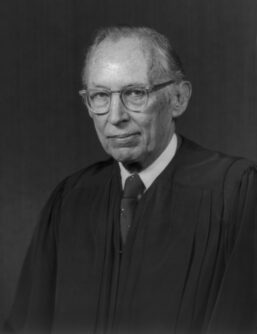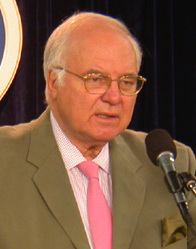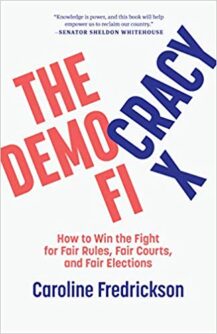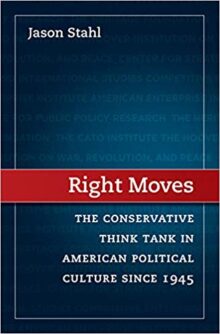Too tidy and convenient an explanation for today’s conservative policy activism.
About a decade ago, the late Peter Dobkin Hall was compiling an archive of documents relating to the history of philanthropy, and he asked me to send along a copy of the famous “Powell Memo,” a document providing strategic political advice to the U.S. Chamber of Commerce, written in 1971 by soon-to-be-Supreme Court Justice Lewis Powell.

For all its fame as the essential blueprint for conservative public-policy dominance, Hall had been unable to come up with a copy. But he knew me to be a loyal employee of a conservative foundation, given no doubt to an exaggerated respect for founders’ and donors’ intents. So surely, he suggested, I must have a copy of the document—perhaps framed and mounted above my desk, next to my copy of the Constitution.
Except that I didn’t have a copy. Nor, I told him, had I ever read it. I had heardof it by then, but only because persistent rumors had it that my entire career was but a fulfillment of the Memo’s mandate. Hall agreed with me then that the reputation of the elusive Powell document had probably far exceeded its actual influence.
This came to mind last week when Carlos Lozada reviewed two books for The Washington Post—one of which, Caroline Fredrickson’s The Democracy Fix: How to Win the Fight for Fair Rules, Fair Courts, and Fair Elections, once again argued that all conservative policy success followed directly from the Powell Memo, which she describes as “the road map for conservative dominance of public policymaking.” She proceeds to trace the Memo’s influence throughout all the familiar conservative think tanks, scholars, publications, activist nonprofits, and university programs, with heavy emphasis on their manifest intention to subvert American democracy. She concludes the volume with her own counter-version of the Memo, a “Public Memorandum” entitled “Advancing American Democracy,” addressed to “Progressive Americans.”
Wisely, Lozada admits that “some suggest [the Memo’s] historical influence has been exaggerated,” and he cites Mark Schmitt’s thorough and insightful treatment thereof in Washington Monthly a couple of years ago. Schmitt too expresses some puzzlement about the Memo’s infamy, which would have remained just another dusty document in the Chamber’s archives had columnist Jack Anderson not obtained a copy in 1972. Anderson speculated in a subsequent Washington Post op-ed that this surely meant Powell could never be an unbiased justice in cases involving business.
And then the Memo disappeared down the memory hole for 40 years.
By 2005, though, Rob Stein had dusted off the Memo and made it the Rosetta Stone for understanding conservative policy success. He included it in his famous PowerPoint deck describing the rise of the vast, permanent conservative intellectual infrastructure, and urging progressive funders to replicate the Memo’s approach. The Democracy Alliance, today managed by the redoubtable Gara LaMarche, grew out of these efforts.
To give us an idea of the Memo’s now-legendary status, Schmitt quotes from Hedrick Smith’s Who Stole the American Dream?, published in 2012. Powell had served as “a commanding general gearing up an army for battle,” with a document that “generated broad tremors of change in corporate America and set off a seismic transformation of our political system,” Smith wrote.
Schmitt’s take-down of the “Myth of the Powell Memo” occurs in the context of his review of Jason Stahl’s Right Moves: The Conservative Think Tank in American Political Culture Since 1945. Stahl had a much more sober view of the Powell Memo, rightly noting that for all its notoriety, it in fact appeared fairly late on an intellectual scene already enlivened by the sort of activity he recommended. And the policy strategies pursued by conservatives thereafter bore little resemblance to those recommended by Powell.
For Powell, business had been far too timid and inept at striking back against the past decade’s waves of criticism from universities, politicians, the pulpit, and the media. Indeed, “one of the bewildering paradoxes of our time is the extent to which the enterprise system tolerates, if not participates in, its own destruction.”
The Chamber itself must lead the charge against the market’s critics, hiring a substantial staff of business-friendly speakers and scholars who would demand equal time on the campuses, monitor textbooks for bias, urge the need for faculty balance on campuses, and produce “attractive, well-written paperbacks on ‘our side.’” American business also must understand that “political power is necessary; that such power must be assiduously cultivated; and that when necessary, it must be used aggressively and with determination.”
A different path, pursued
But as Stahl argues, William J. Baroody, Sr., president of the American Enterprise Institute (AEI), suggested a very different path, and indeed, the one that conservatism ultimately pursued. Contrary to Powell’s suggestion that business should wield its power directly and forcefully, Baroody argued instead for a free-standing think tank that would be considerably more friendly to business, but would not be subject to corporate approval in its work, nor entirely beholden to it for funding. Instead, it would draw its support primarily from the newly emerging conservative private foundations.
More important, as I came to appreciate as an intern at AEI beginning in 1977, it would provide a defense of American freedom that was far more nuanced and balanced than Powell’s narrow and transparent PR campaign for corporate America. The scholars I encountered at AEI were not at all the robotic defenders of capitalism that would have been recruited by the Chamber. They were, rather, broadly educated scholars of independent standing in economics, sociology, history, urban affairs, and political science.
Furthermore, they understood that the marketplace could not be defended against the assault of the left purely because it was an efficient producer of great material abundance. As AEI resident scholar and theologian Michael Novak argued, free markets were instead an inseparable part of a trinity, alongside a free democratic political system and a lively and diverse moral and religious sector.

Indeed, many of the scholars agreed with AEI stalwart Irving Kristol that capitalism merited only “two cheers,” not Powell’s enthusiastic three. The marketplace, to be sure, could be counted on for widespread prosperity and cultivation of the “domestic virtues” of “prudence, diligence, trustworthiness, and an ambition largely channeled toward ‘bettering one’s condition,’” as Kristol wrote in Two Cheers for Capitalism. But these would never be enough for our intellectual elites, whose utopian views of human perfectibility harbored nothing but contempt for the modest possibilities reliably pursued by capitalism.
That those utopian schemes were as disastrous in practice as they were alluring in theory was a shared, firsthand experience of many of the scholars and fellows at AEI. Far from being life-long, faithful conservatives, many of them were only beginning to migrate over from the left, disillusioned alike by the failure of the Great Society and the New Left reaction it spawned.
Novak had been a theologian with radical inclinations, as well as a campaign speechwriter for the McGovern/Shriver ticket in 1972. Peter Berger and Richard John Neuhaus had—not too long before—co-authored Movement and Revolution, with Neuhaus being willing to contemplate the necessity of revolution in response to the Vietnam War. Former LBJ adviser Ben Wattenberg was basically managing the Coalition for a Democratic Majority out of his AEI office, seeking to take the Democratic Party back from its far-left wing. And resident fellow Robert Woodson had just come over from the Urban League, where he saw the promise of the civil-rights movement betrayed by its leadership, leaving its purported beneficiaries as much mired in poverty as ever.
None of these scholars was anywhere close to doctrinally conservative at the time, but they all knew full well that the exalted promises of progressivism had failed, and that they were peculiarly qualified to testify thereunto, from the very belly of the beast. I dare say none of them would have applied for, much less been accepted into, the Chamber of Commerce’s council of scholars recruited to explain the wonders of the free-market system.
Controversy, and compromise
One argument upon which Baroody and Powell would have agreed was the peculiar inability or reluctance of the business world to provide an effective defense of its activities. As Powell noted in the Memo, business leaders had a tendency to “compromise and appease critics.” While Powell held out hope that the “wisdom, ingenuity and resources of American business” could be “marshalled against those who could destroy it,” my experience at AEI suggested otherwise.
Robert Goldwin, President Gerald Ford’s “resident intellectual,” had been recruited by Baroody to host a series of “CEO Seminars” in the mid-70s, among other projects. A dozen or so corporate leaders would gather for a day and a half in AEI’s boardroom, where they would hear Kristol, Novak, and others make a pitch somewhat similar to Powell’s: as Goldwin once described it, “you have to understand that there are hundreds of activists and scholars who wake up every morning, look at themselves in the mirror, and ask, ‘what can I do today to destroy capitalism?’”
Often, the CEOs would emerge from these sessions, now apprised of the extent of the threat, determined to defend capitalism far more vociferously than before. But, as Goldwin ruefully observed, they would then charge back to corporate HQ, where the marketing and PR gurus would point out that political controversy might hurt sales, the corporation’s charitable arm would remind the CEO that this wouldn’t earn the company that coveted “humanitarian of the year” award, and family members would complain that it would make for uncomfortable cocktail parties at the country club. So the compromise and appeasement continued.
As the CEO Seminar example suggests, it’s unlikely that the Chamber of Commerce would ever have pursued vigorously the sort of political activities suggested by Powell, though committees were appointed and meetings were held. By contrast to this corporate timidity, the scholars gathered at AEI were prepared to do intellectual battle with the failed utopias of the left, based on intimate familiarity with its doctrines, thoroughly trained in its techniques, and impassioned by the betrayal of its high promise.
Why then the persistence of the myth of the Memo? I would say that it provides the left with a far more tidy and convenient explanation for today’s conservative policy activism. A Southern tobacco lawyer (as critics invariably point out) urges the business community to wield its political power ruthlessly against its liberal critics. So today’s conservative presence in American politics must flow directly from the marriage of Southern racism with corporate plutocracy. Perfect fit! But the reality is so much more complicated and interesting.





